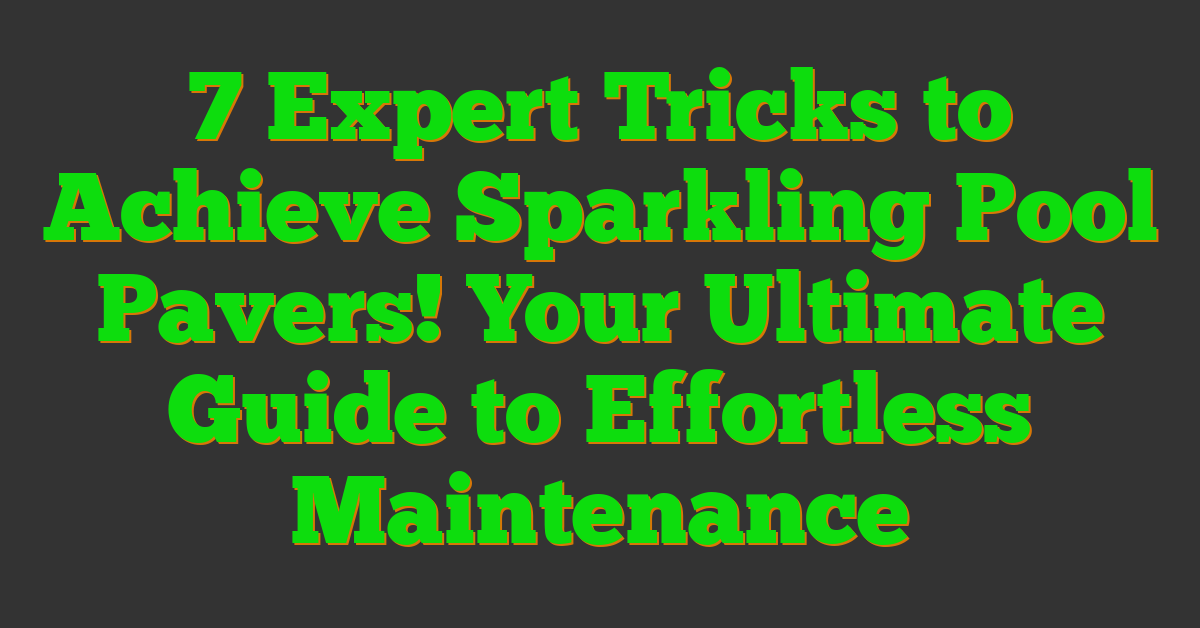So, you’ve got a beautiful pool, but those pavers surrounding it are looking a little worse for wear, huh? We’ve all been there! Cleaning the pavers around your pool can be a quick and satisfying task that instantly spruces up your outdoor oasis.
Understanding Pavers Around Your Pool
The Importance of Regular Cleaning
As landscape designers, we know that maintaining the pavers around your pool is crucial to preserving their beauty and longevity. Regular cleaning not only enhances the aesthetic appeal of your outdoor space but also prevents the buildup of dirt, grime, and algae that can make the area slippery and unsafe. By keeping your pavers clean, you not only ensure a welcoming environment for your family and guests but also extend the lifespan of these hardscape features.
Types of Pavers and Their Cleaning Needs
When it comes to cleaning pavers around your pool, it’s essential to understand the type of pavers you have and their specific cleaning requirements. Different paver materials such as concrete, natural stone, and brick require distinct maintenance approaches to prevent damage and discoloration. For example, while concrete pavers are durable and relatively easy to clean with a pressure washer, natural stone pavers are more porous and may need special sealants to protect them from staining.
As landscape designers, we recommend familiarizing yourself with the type of pavers you have installed around your pool to ensure you use the appropriate cleaning methods and products. By understanding the unique characteristics of each paver material, you can effectively maintain their appearance and structural integrity for years to come.
Preparing to Clean Your Pool Pavers
Gathering Necessary Cleaning Supplies
When we prepare to clean pool pavers, it’s essential to gather the right cleaning supplies to ensure an effective and safe cleaning process. We need to have the following supplies ready:
- A stiff-bristled broom or brush to remove loose debris and dirt from the pavers.
- A garden hose with a spray nozzle or a pressure washer for rinsing the pavers.
- A mild detergent or specialized paver cleaner to tackle tough stains and grime.
- A bucket for mixing the cleaning solution and a scrub brush for spot cleaning.
- Protective gear such as gloves, safety glasses, and closed-toe shoes to safeguard ourselves during the cleaning process.
- Wear appropriate protective gear such as gloves, safety glasses, and closed-toe shoes to shield ourselves from any chemicals or debris.
- Check the weather forecast to ensure we choose a day with favorable weather conditions for cleaning the pavers.
- Test the cleaning solution on a small, inconspicuous area of the pavers to ensure it doesn’t cause discoloration or damage.
- Keep pets and children away from the cleaning area to avoid any potential harm or exposure to cleaning chemicals.
By following these safety measures, we can ensure a smooth and secure cleaning process for our pool pavers.
Basic Cleaning Methods for Pool Pavers
Sweeping and Rinsing Techniques
When it comes to maintaining the pristine look of your pool pavers, we emphasize the importance of regular sweeping and rinsing. By sweeping your pool pavers with a broom or brush, you can easily remove dirt, leaves, and debris that accumulate over time. This simple step not only enhances the appearance of your outdoor space but also prevents stains and mold growth.
After sweeping, rinsing the pavers with a garden hose or pressure washer can help dislodge stubborn dirt and grime. We recommend starting from the top of the pavers and working your way down to ensure thorough cleaning. Remember to adjust the water pressure according to the type of pavers to avoid causing any damage.
Stain Removal Solutions
In the event of stubborn stains on your pool pavers, we have effective solutions to address these issues. For oil-based stains, applying a poultice made of baking soda and water can help absorb the oil and lift the stain from the surface. Simply apply the poultice to the affected area, let it sit for a few hours, then gently scrub and rinse.
For rust stains, a mixture of lemon juice and salt can work wonders. The acidic properties of the lemon juice combined with the abrasive quality of salt can help break down the rust stains. Apply the mixture to the stained area, let it sit for a while, then scrub and rinse thoroughly.
By incorporating these basic cleaning methods into your routine maintenance, you can ensure that your pool pavers remain in top condition, enhancing the beauty of your outdoor oasis.
Advanced Cleaning Techniques
Pressure Washing for Deep Cleaning
When it comes to advanced cleaning techniques for pavers around the pool, pressure washing is a powerful method we recommend for a deep clean. Pressure washing uses pressurized water to remove deep-seated dirt, grime, and stains effectively. It’s important to adjust the pressure setting on the washer to prevent damage to the pavers, especially for softer materials like natural stone. We suggest starting with a lower pressure setting and gradually increasing it if needed while maintaining a safe distance from the surface to avoid any potential harm.
Eco-Friendly Cleaning Alternatives
For those looking to clean pool pavers using eco-friendly methods, there are several alternatives that we advocate for. One of our top recommendations is utilizing a mixture of white vinegar and water, which can effectively combat mold and mildew without harsh chemicals. Additionally, a solution of hydrogen peroxide and water can help brighten pavers and eliminate stubborn stains without harming the environment. These eco-friendly cleaning alternatives not only protect the surroundings but also ensure the longevity of your pool pavers while maintaining sustainability practices.
Preventing Future Stains and Issues
Sealing the Pavers
When it comes to preventing future stains and maintaining the beauty of your pool pavers, sealing them is a crucial step in our landscaping process. Sealing your pavers creates a protective barrier that repels water, oils, and other substances, reducing the likelihood of stains and enhancing the durability of the surface. We recommend using a quality sealer specifically formulated for your paver material, whether it’s concrete, natural stone, or brick. Regularly reapplying the sealer per manufacturer recommendations will ensure long-lasting protection for your pool pavers.
Regular Maintenance Tips
Incorporating regular maintenance practices into your pool paver care routine is essential for preventing stains and issues down the road. Simple tasks like sweeping the pavers regularly to remove debris and dirt can go a long way in preserving their appearance. Additionally, rinsing the pavers with water on a weekly basis helps prevent the buildup of grime and contaminants that could lead to stains. Keeping an eye out for any signs of damage or wear and addressing them promptly can also help maintain the integrity of your pool pavers. By staying proactive with maintenance, you can enjoy a clean and pristine pool area for years to come.
Conclusion
Maintaining clean pool pavers is essential for a pristine pool area. By following the right cleaning techniques and using eco-friendly alternatives, we can ensure our pool pavers remain free from stains and mold. Regular maintenance practices, such as sweeping, rinsing, and sealing, are key to preserving the appearance and longevity of our pool pavers. With these tips in mind, we can enjoy a beautiful and inviting pool area for years to come.













